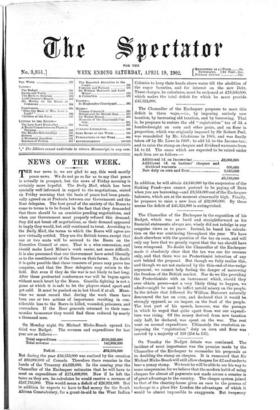The Chancellor of the Exchequer proposes to meet this deficit
in three ways,—i.e., by imposing entirely new taxation, by increasing old taxation, and by borrowing. That is, he proposes to restore the old " registration" tax of 3d. a hundredweight on corn and other grain, and on flour in
proportion, which was originally imposed by Sir Robert Peel, was remodelled by Mr. Gladstone in 1864, and was finally taken off by Mr. Lowe in 1869 ; to add 1d. to the Income-tax; and to raise the stamp on cheques and dividend warrants from Id. to 2d. The sums which are expected to be raised under each item are as follows :- Additional id. on Income-tax £2,000,000 Additional ld. on bankers' cheques and dividend warrants 500,000 New duty on corn and flour 2,650,000 £5,150,000 In addition, he will obtain £4,640,000 by the suspension of the Sinking Fund—you cannot pretend to be paying off Debt when you are borrowing—and £3,534,000 out of the Exchequer balances, which are at the moment abnormally high. Finally, he proposes to raise a new loan of £32,000,000. By these means the deficit of £45,324,000 is extinguished.










































